- Home
- Thomas E. Sniegoski
Where Angels Fear to Tread Page 3
Where Angels Fear to Tread Read online
Page 3
I think were finished here, Mrs. Grantmore stated, shoving the bag into her purse.
And Remy couldnt have agreed more. For a brief instant he imagined the woman on her knees, begging forgiveness from the frightening visage of what he truly was, golden armor glistening, powerful wings beating the air as they held his mighty form aloft.
A soldier of God.
Seraphim.
But no matter how his true nature fought him, that wasnt who he was anymore.
Thank you for your time, Mr. Chandler, the woman said stiffly, offering her hand as they stood.
Youre welcome, Remy said, taking and quickly releasing her hand, yet again resisting the urge to end her hateful existence in a searing release of Heavens fire. Ill send you my final invoice before weeks end.
Without comment, the woman bent to gather her things, and Remy turned to her daughter.
It was very nice meeting you, Olivia, he said, holding out his hand.
She took it with a small smile.
Im truly sorry about this, he told her as his gaze drifted to a displeased Mrs. Grantmore.
As am I, Mr. Chandler, Olivia said, releasing his hand.
Remy left the two women then, feeling Mrs. Grantmores eyes burning into his back as he walked toward the stairs, certain in the knowledge that it would take much more than Tylenol to kill the disease that grew inside her.
Outside the Westin, it was hot and humid, but how else would Boston be in August?
A quick glance at his watch showed Remy that if he didnt hurry, he would be late for his early dinner date with his friend Steven Mulvehill. Not that it really mattered; the homicide detective was never on time anyway.
Remy walked up Dartmouth Street toward Beacon, not a little concerned about his reaction toward Mrs. Grantmore. It was taking less and less these days to rouse the angelic nature he had worked so hard to contain. A sign of the times, most definitely, he mused as he stopped to let a cab pass that would certainly have run him down if hed stepped in front of it.
And what then? he thought. Would the Seraphim have emerged to smite the vehicle and its driver?
A few years ago, a thought like that would have been just plain foolish. But now, since the death of his beloved wife, he couldnt be so sure. Everything had changedin the earthly world, as well as in the unearthly.
He looked around him. Things looked the same, but the difference was there, an undercurrent. Whether they knew it or notthe pretzel man, the student, the teller at the bank stepping out for a quick cigarette breakthe world was different.
And not in a good way.
Remys own world had begun to change dramatically when his wife first became ill. From there it was as if a row of cosmic dominoes had begun to fall, with the disappearance of the Angel of Death and then the narrow averting of the Apocalypse, the nearly unbearable pain of Madelines death, the return of Lucifer Morningstar to Hell, and the loss of Francis, the former Guardian angel who had been Remys friend and frequent comrade in arms.
And it was just the beginning; of this Remy was sure.
He turned down Beacon Street, and the disturbing realization of how dramatically different things were suddenly became a reality when he caught sight of the bedraggled form of Steven Mulvehill waiting in front of the restaurant.
On time.
And the world became that much stranger a place.
The restaurant was pricey, even for an early dinner, but Mulvehill had a gift certificate hed gotten from another detective whose wife had developed a wheat allergy and, according to Mulvehill, couldnt go out to eat anymore.
Remy was pretty sure there was more to the story; there always was when it came to things surrounding Mulvehill, but he didnt feel the need to dig any further. A free dinner was a free dinner, and he would leave it at that.
Working today? Mulvehill asked, reaching for his glass of water, in which a fresh lemon slice floated amongst the ice.
Remy popped another french fry into his mouth, nodding while he chewed.
More of the weird shit? Mulvehill asked, leaning forward to pick up the second half of an amazingly large hot pastrami sandwich that he had slathered with dark mustard.
Remy was having a cheeseburger, and, like the fries, it was excellent. He didnt have to eat; his sustenance came from the life energies around him, but eating had become one of his biggest pleasures and he wouldnt give it up for anything.
Nope, nothing weird this time, he said, picking up his burger. Just a very wealthy woman looking to put the kibosh on her daughters relationship.
That bitch, Mulvehill snarled, wiping his mustard-covered hands on the cloth napkin. Remy noticed that some of the dark condiment had dribbled onto his friends tie, but there were so many other stains there already, it wasnt worth mentioning. Did you set her straight? No, waitdid you get paid, and then set her straight?
Final bill hasnt gone out yet, but it will, Remy said around a large bite of burger. He hesitated a moment, then continued.
She really pushed my buttons; I had to stifle the urge to fry her where she sat, he said, not looking at his friend. He pulled a slice of red onion from his sandwich and stuffed it into his mouth.
Mulvehill was strangely silent, and Remy looked up. The homicide detective knew all of Remys secrets, and he was the only one Remy could share this withnow that Maddie was gone. He knew Mulvehill often wished he didnt know what he did, but that cat had been let out of the bag some time ago.
And besides, it always led to really interesting conversations.
Seriously? Mulvehill finally asked. You really wanted to burn her alive with your angel superpowers?
Remy halfheartedly nodded, shrugging his shoulders as he tried to explain. It wasnt really me per se, but, yknow, the part of me that . . . you know.
Mulvehill slowly nodded. Yeah, I know, but damn. Remind me never to piss you off unless were near a fire extinguisher or a lake or something. He picked up a half-eaten pickle spear from his plate and took a bite.
Id never burn you alive, Remy said. He set what was left of his burger on his plate. With all the booze you drink, youd probably go off like some great big, fleshy Molotov cocktail.
Oh, youre a fucking riot, Mulvehill said sarcastically. He reached for his water and held up the glass. See, water. He took a drink.
Only because youre on duty, Remy teased. If you were off today, wed probably need another three gift certificates to handle the bar bill.
See if I invite you out on my dime again, the homicide cop said, going back to his mustard-drenched sandwich.
Its a gift certificate, Remy reminded him.
Yeah, that I could have used with any number of hot babes trying to become the next Mrs. Mulvehill.
Remy laughed, leaning back in his chair. Any number of babes? he repeated. He pulled a few more fries from his plate. Thats good.
What, you dont think Im desirable? Mulvehill asked with a smile, a giant gob of brown mustard oozing down his chin.
If we werent in a public place, Id take you now, you gorgeous hunk of man, Remy said.
They both laughed, then turned their attentions toward finishing their meals.
Did you really want to burn her? Mulvehill asked suddenly, breaking their silence. Seriously?
Remy looked up into his friends worried gaze. He couldnt lie to him. Yeah, I did, he answered quietly. He took the napkin from his lap and wiped his mouth.
I have to say that isnt such a good thing.
Remy agreed. No, and it worries me. Since Madeline . . . I feel myself drifting. . . . Not all the time, but sometimes, when certain things push a button.
Mulvehill noisily chewed the last of his pastrami sandwich and wiped the grease and mustard from his face. The next well-done corpse I find in the city, Im looking for
you, pal, he said.
Remy gripped his water glass, staring at the ice and lemon slice. It scares me.
His friend remained quiet. No snarky comeback; it wasnt the time.
Im afraid of the day when I cant . . . when I dont want to keep it inside anymore.
Is that a possibility? Mulvehill asked.
Could be. Remy shrugged. Probably not right now, but there could come a time when I wont have the things around me that keep me anchored to this world.
Like Maddie, Mulvehill said quietly.
Remy silently nodded. She was the most amazing thing in my life here, but now theres just this giant void where she used to be. He could feel a darkened mood descending on him, as it had a tendency to do when he thought too hard about things connected to his fragile humanity.
I know what your problem is, Mulvehill said, tossing his napkin onto the tabletop. I shouldve given you the gift certificate.
Remy looked across the table at his friend. Shouldve given me the gift certificate? What the hell are you talking about?
You couldve used it for a date, Mulvehill said. You couldve taken somebody out for a nice dinner and maybe found a new anchornot that anybody could ever replace Maddie. Im just saying it might help.
Remy had to laugh. You think I should date? he asked incredulously.
Yeah, why not? Mulvehill asked. What was the name of that woman you told me about? He snapped his fingers. The waitress . . . you know who I mean.
Linda, Remy said, focusing on the water in his glass again.
Yeah, Linda. Why not go out with her?
It was all so very complicated. Remy had met Linda Somerset through Francis. During the Great War in Heaven, Francis had chosen the wrong side, but then saw the error of his ways and was desperate to make amends. The Almighty had given him the duty of watching over one of the passages to the Hell prison of Tartarus, which just so happened to be in the basement of the apartment building that the Guardian angel owned on Newbury Street.
The last time Remy saw Francis, he had been badly wounded in the effort to prevent the Morningstars catastrophic return to Hell. Remy still held out hope that somehow Francis had managed to survive.
Although as time passed, it was becoming less and less likely.
Francis had been obsessed with Linda Somerset, even though she knew nothing of his interest. Remy had spoken to the attractive waitress at Newbury Streets Piazza restaurant a few times since Francis disappearance, and he could understand his friends fixation.
There was definitely something about Linda Somerset.
Id rather not talk about it, Remy said, hoping, but doubting, that would be the end of the discussion.
Their waiter approached the table. Are you gentlemen finished? he asked, reaching for their plates.
Could you wrap that last piece of burger in some foil for me? Remy asked the well-groomed Hispanic man who had introduced himself as Harry.
Harry smiled. You must have a dog? he asked, lifting the plate from the table.
No, hes gonna have that as a snack later, Mulvehill offered. Hes really cheap.
Will you shut up, Remy snarled. Yes, I do, and if I dont bring him something, Im going to be in trouble.
No problem, Harry said. Any coffee or dessert?
They both declined, Mulvehill sticking out his belly and patting it as a sign that he was sated.
The waiter said hed be back with Remys food, and the check, excusing himself as he left with their dirty plates.
So, why not? Mulvehill started up again
I said I dont want to talk about it, Remy said, trying not to become upset with his friend. He did not want to even think about burning his best friend alive. Its far too early for me to even be thinking about things like this; Madeline hasnt even been gone six months.
Stop right there, Mulvehill said. I dont mean to be cold or heartless, but you just said the magic words.
Remy tilted his head inquisitively to one side, as hed so often seen Marlowe, his four-year-old Labrador retriever, do.
Madelines gone, Remy, the detective said. I know how you felt about herI loved her toobut if her being gone and your being lonely mean youre going to start losing your shit and frying people every time you get annoyed, maybe you should think about the benefits of some female companionship.
Mulvehills words were like a kick to the teeth, and Remy really didnt know how to react.
Youre not pissed that I said that, right? Mulvehill asked cautiously as Harry returned to the table with their check and Remys leftovers wrapped in foil.
No, Remy lied.
Youre not gonna cook my ass? he asked, pulling the wrinkled gift certificate from the inside pocket of his sports jacket and placing it in the leather folder with the check and an equally wrinkled twenty-dollar bill.
At first Remy didnt answer.
You heard what I said about the dangerous levels of alcohol in your body.
Screw you. Are you mad at me or not?
Im not mad. I just dont want to talk about this anymore, Remy said, slowly getting up from his seat.
You said Maddies been gone for less than six months, and I bet its been the longest almost six months of your life, hasnt it? the normally unemotional man said, gripping Remys elbow. I hate to see you like this and then to hear you say things about losing control. It just gets me thinking that . . .
Im all right, Steven, Remy said, forcing a smile. Really, Im all right. I think this case just brought out my bad side, but its done now, and I can get back to my naturally cheerful self.
He felt his friend studying him, searching for a sign, a crack in the armor. Remy started for the door so Mulvehill couldnt look closer.
Hey, Chandler, his friend called.
Remy turned slowly.
The homicide detective was holding the piece of foil-wrapped hamburger.
You taking this or do you want to be on your dogs shit list?
Remy returned to take the package from Mulvehill.
If there was one shit list he couldnt bear to be on, it was Marlowes.
Marlowe paced excitedly in the backseat of Remys Corolla.
Rabbits. Remy heard the dog muttering beneath his breath in the guttural language of his breed. Rabbits, rabbits, rabbits.
And maybe squirrels, Remy contributed, looking at the dogs reaction in his rearview mirror.
Maybe squirrels, Marlowe repeated. Rabbits; maybe squirrels.
Remy had returned to his Pinckney Street home, strangely agitated after his dinner with Steven Mulvehill. His friend had definitely touched on a particularly sensitive nerve.
Putting his signal on, Remy took a right into the parking lot of Mount Auburn Cemetery. He had the pick of the lot and eased into a space in a nice patch of shade thrown by an oak tree.
His wife had been gone for nearly six months and he still felt the magnitude of her passing each and every day. The idea that he could push aside her memory, and the love he still felt for her, was unthinkable.
So why was it that deep down, he knew his friend was probably right?
Marlowe was panting like a runaway freight train as he turned off the cars engine and opened the door to a blast of August heat.
All right, all right, Remy said, opening the passenger-side rear door.
Marlowe leapt out, immediately placing his nose to the ground and beginning to track his prey.
Anything? Remy asked.
Rabbits; maybe squirrels, Marlowe reported quite seriously.
Thought so, Remy answered.
There was no one in sight, so he let Marlowe roam. He followed his dog through the metal gateway onto the winding path that led through one of the prettiest cemeteries in the Greater Bost
on area. Marlowe continued the hunt, nose moving along the ground, and off the path to the grassy areas around the trees and grave markers.
Hey! Remy called.
The Labrador stopped and lifted his head.
No peeing on the headstones, Remy reminded him.
No pee, Marlowe grumbled.
It was certainly hot, but there was a hint of a cooling breeze from the north, a harbinger of less-stifling weather, and perhaps even some much-needed rain, the angel thought.
The vast lawns surrounding the grave sites were dappled with dried, brown patches of grass, and even the trees had that parched, withered look with branches hanging low.
But things couldnt have been more different at Madelines plot.
The green around her grave site was lush, dark, and healthy, with wildflowers more vibrant than all the colors of the rainbow surrounding her concrete marker as if in celebration. This was how it was year-round, a special gift to her memorya thank-you from the Angel of Death, Israfil, to Remy, for his help in preventing the angel from triggering the Apocalypse.
Remy approached the grave as he normally did, feeling the same pangs of sadness then that hed had during his very first visit.
Hey, beautiful, he said, reading her name on the stone, while admiring some of the more unusual blooms that flourished there. He was pretty sure that most of the flowers werent even native to this hemisphere, but here they were, growing just for her.
Howre things? he asked, kneeling upon the grave. There were some weeds growing up amongst the flowers, and he reached down, plucking them from the always-fertile ground.
Remy knew his wife wasnt actually there anymore.
He knew full well that when she had passed, her remaining life energies had immediately left her body and returned to the source of power in the universe that made all things. The stuff of creation; Madeline was in the sun and the stars, the trees and the grass; a part of everything that flew, crawled, swam, slithered, ran, and walked upon the surface of the earth.
Yes, Madeline as he remembered her wasnt there anymore, but he liked to come to this place of beauty to honor her memory. It was a monument to the amazing person she had been and to the special love they had shared.

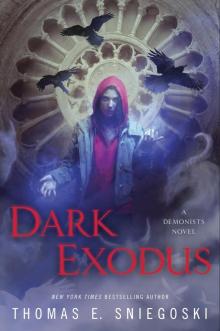 Dark Exodus
Dark Exodus A Hundred Words for Hate rc-4
A Hundred Words for Hate rc-4 The Fallen
The Fallen Where Angels Fear to Tread rc-3
Where Angels Fear to Tread rc-3 Armageddon
Armageddon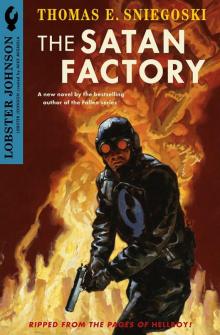 The Satan Factory
The Satan Factory In the House of the Wicked: A Remy Chandler Novel
In the House of the Wicked: A Remy Chandler Novel A Hundred Words for Hate
A Hundred Words for Hate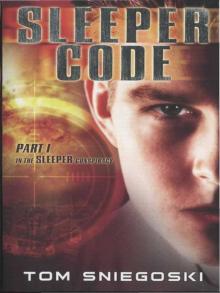 Sleeper Code
Sleeper Code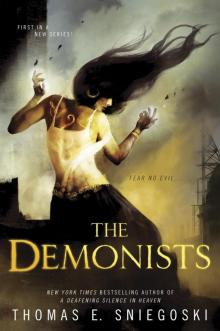 The Demonists
The Demonists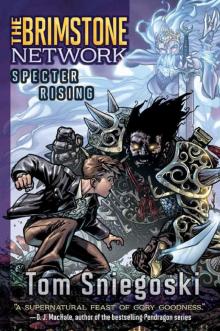 Specter Rising (Brimstone Network Trilogy)
Specter Rising (Brimstone Network Trilogy) Dancing on the Head of a Pin
Dancing on the Head of a Pin The Shroud of A'Ranka (Brimstone Network Trilogy)
The Shroud of A'Ranka (Brimstone Network Trilogy)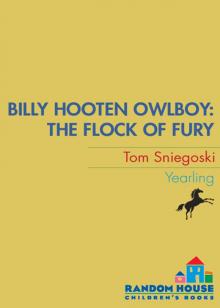 The Flock of Fury
The Flock of Fury Where Angels Fear to Tread
Where Angels Fear to Tread Leviathan
Leviathan Walking In the Midst of Fire: A Remy Chandler Novel
Walking In the Midst of Fire: A Remy Chandler Novel Billy Hooten
Billy Hooten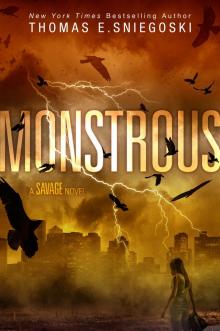 Monstrous
Monstrous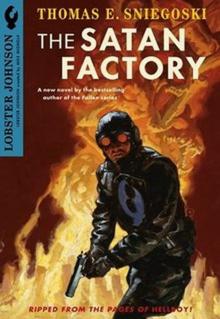 Lobster Johnson: The Satan Factory
Lobster Johnson: The Satan Factory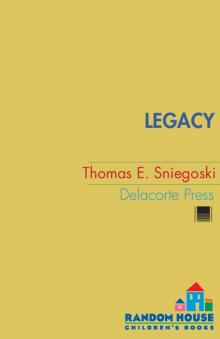 Legacy
Legacy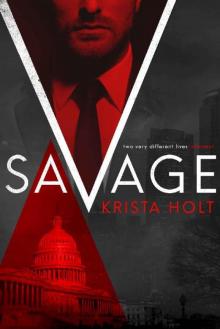 Savage
Savage Walking In the Midst of Fire rc-6
Walking In the Midst of Fire rc-6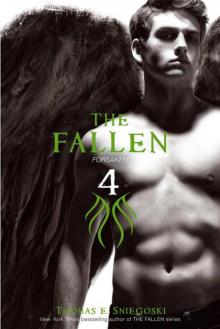 The Fallen 4
The Fallen 4 A Deafening Silence In Heaven
A Deafening Silence In Heaven A Kiss Before the Apocalypse
A Kiss Before the Apocalypse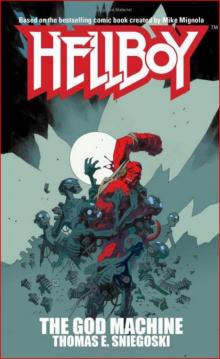 The God Machine
The God Machine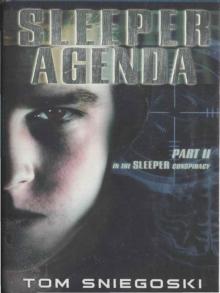 Sleeper Agenda
Sleeper Agenda The Girl with the Destructo Touch
The Girl with the Destructo Touch Dancing On the Head of a Pin rc-2
Dancing On the Head of a Pin rc-2 In the House of the Wicked rc-5
In the House of the Wicked rc-5 Reckoning f-4
Reckoning f-4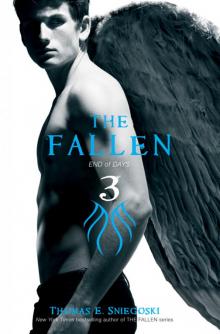 The Fallen 3
The Fallen 3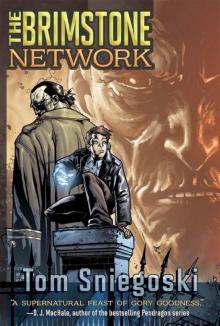 The Brimstone Network (Brimstone Network Trilogy)
The Brimstone Network (Brimstone Network Trilogy)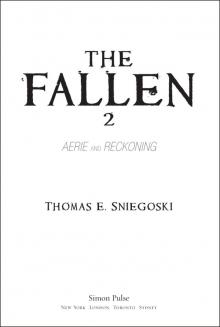 The Fallen 2
The Fallen 2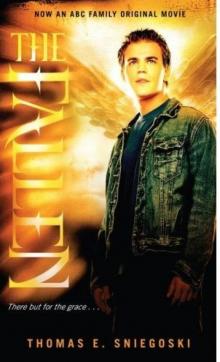 The Fallen f-1
The Fallen f-1